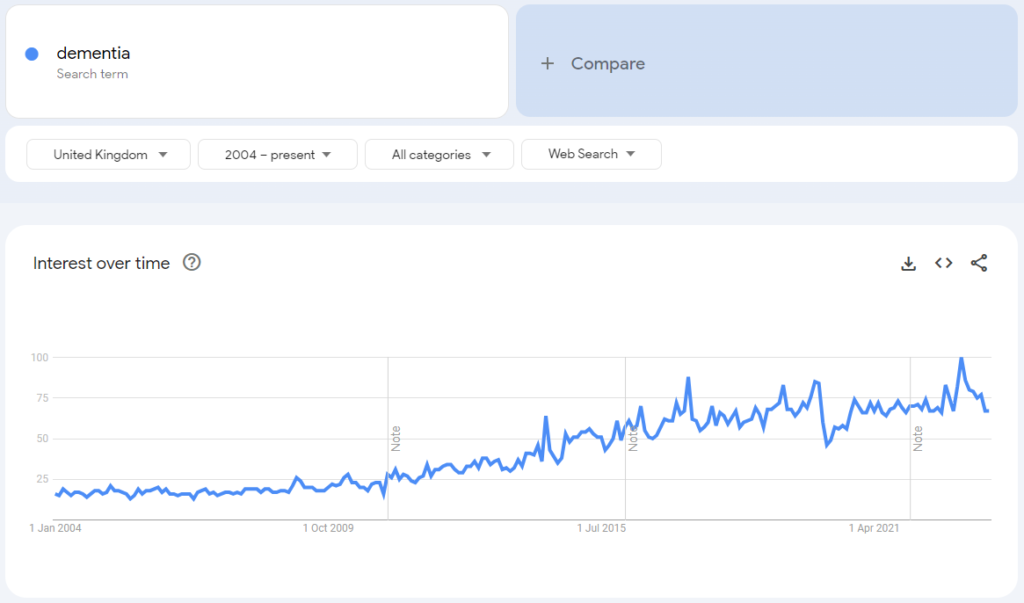Dementia, a condition that affects memory, cognitive abilities, and daily functioning, is on the rise in the UK. With an ageing population, it is essential to explore how the NHS will cope with the growing number of dementia cases in the future. In this article, we delve into the impacts of this rise, including care, costs, sustainability, and what lessons can be drawn from other countries’ experiences in managing dementia in their healthcare systems.
The Current Scenario
The word “dementia” is slowly becoming more and more common in public discourse. We can see evidence of its growing impact on society by looking at the Google Trends UK data, below, which shows a marked increase in people searching for information on the search engine since 2004.

As cases continue to rise globally (with Alzheimer’s Disease International reporting a doubling every 20 years), several challenges come to the forefront for the NHS and how it manages its dementia agenda:
1. Increased Demand for Care Services: With more people being diagnosed with dementia, the demand for specialised care services is growing. This includes residential care, home care, and specialised dementia units.
2. Escalating Costs: Dementia care is expensive. The cost of providing quality care, including trained staff, specialised facilities, and medical treatment, is a significant financial burden.
3. Sustainability Concerns: The sustainability of the NHS’s current approach to dementia care is a pressing issue. Ensuring quality care while managing costs is a complex balancing act.
Currently in the UK, several dementia charities provide pivotal support for those with dementia and their families. As services of Dementia UK and others continues to grow, questions remain how support will be funded when demand inevitably rises further.
Global Insights
To gain insights into how the NHS can adapt and learn from other healthcare systems, let’s look at what some countries have done to manage dementia:
1. Netherlands: The Dutch healthcare system emphasises “dementia villages” or “care neighborhoods”. These are small, self-contained communities where individuals with dementia live in a safe, supportive environment. It promotes a sense of normalcy while ensuring round-the-clock care.
2. Japan: Japan has adopted innovative technologies like robotic caregivers and smart homes to support dementia patients. These technologies assist with daily tasks and reduce the burden on caregivers.
3. Australia: Australia’s Dementia Training Study Centres provide specialised training for healthcare professionals, ensuring a skilled workforce to cater to the growing dementia population.
The Way Forward
The NHS is actively addressing these challenges and working towards a sustainable future for dementia care. Some potential strategies include:
1. Early Diagnosis and Intervention: Identifying dementia at an early stage can lead to more effective interventions, slowing down its progression and reducing long-term care costs.
2. Investment in Research: Continued research into dementia prevention, treatment, and care strategies is essential for innovation and cost-effective care.
3. Community-Based Care: Promoting community-based care and support networks can help individuals with dementia stay in their homes for longer, reducing the burden on residential care facilities.
What is clear is that the NHS needs a firm strategy for managing dementia care going forwards. Not only will a rise in demand impact on acute and chronic care services it provides, but will further increase pressure on care homes and domiciliary services too – something many would argue is already poorly managed and provisioned for.
Conclusion
The rising prevalence of dementia presents the NHS with complex challenges, from increasing care demands to escalating costs. However, by learning from global experiences and adopting innovative approaches, the NHS can navigate these challenges and provide quality dementia care in a sustainable manner. Early diagnosis, investment in research, and community-based support systems are key pillars in securing a brighter future for individuals living with dementia in the UK.






